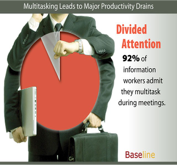The Myth and Madness of Multitasking
By On
There is a decade of research indicating that multitasking does not increase productivity. In fact, some studies (Rubinstein, 2001) indicate that multitasking can actually result in us wasting around 20-40 percent of our time, depending on what we’re trying to do.
For some, multitasking means doing two or more tasks at the same time. For others, it means switching back and forth from one task to another, sometime in rapid succession.
Currently, the way leaders use multitasking borders on madness. Rather than using the research about the detrimental impact of multitasking upon our effectiveness, leaders are using it more than ever. Some inappropriate multitasking may be a result of downsizing and the push to do more with less. However, in many cases, it’s not only doing more work with fewer employees, it’s doing more different types of tasks. Many in leadership positions, no longer have the support staff they had and are required to complete tasks not within their areas of strength. As they add on, new, often tedious tasks, the tendency is to inappropriately multitask.
Imagine the lack of focus and attention during meetings if even 50% rather than 92% of meeting attendees are texting, interrupting others by responding to calls, trying to answer emails, or using the Internet with their tablets. How much respect is shown to others when such multitasking is allowed?
On a personal level, think of the ways in which multitasking is ineffective for you.
- You’re on the phone while answering email. Mistakes are made while typing and the person on the other end is irritated, “Are you paying attention to me. I can hear you typing.”
- In the office, if feels like you’re saving time as you use the speaker phone and clear your desk. But during the momentary lapse of attention, where is that check or file or report? Is it underneath another pile of papers, stuck in the wrong file drawer or thrown in the trash?
Most commonly, there are performance slippages when you try to complete two tasks at once; you reverse numbers, misspell a word, or forget a detail.
The need for uni-focus is greatest when analytic or creative thought is required. In addition, every time you are interrupted or interrupt yourself, it takes time for your brain to refocus. Lastly, after a time, your stress level rises and/or you feel fatigued.
To enhance productivity, especially during meetings, leaders need to discuss the ineffectiveness of multitasking and model the use of total, rather than partial, attention to task.
Here are some tips to decrease your tendency to inappropriately multitask:
- Make a commitment to reduce multitasking, especially during meetings or conversations.
- Chunk your tasks and chores. Set aside specific times for responding to phone messages and emails. Stop the reactive cycle of checking texts and emails every time you have a minute.
- Announce a “cease and desist” time for calling or texting, especially during meetings. Request that phones be on silent and out of the way during a meeting.
- Take frequent, but brief breaks between tasks so that you can re-energize and refocus. This provides the extra effort needed to battle the tendency to multitask.
- Create a checklist to follow when working on tedious, boring, or difficult tasks. Work intensely for a while and then break. Don’t use the Internet or email as a diversion.
- Identify tasks that require analytical, problem-solving or creative effort. Make a commitment to avoid multitasking when doing such tasks.
- Work on the most challenging tasks at times when you are most alert and less apt to be distracted or interrupted by others.
- Model the use of focusing and doing one thing at a time. The results-oriented leader is not a whirling dervish. Rather, such a leader takes the time and effort to listen, ponder and discuss without trying to do two things at once.
- Discuss with staff or team the tasks and times during which undivided focus and sustained attention are required.
- Stop multitasking when members of your staff or team are engaged in conversations. Give them your undivided attention and respect.
In summary, there is a myth that multitasking increases productivity. In fact, according to some researches it can reduce productivity by up to 40-percent. In addition, switching from one to another task requires time to get back on track, makes us more vulnerable to distractions, and is tiring. Leaders have more choice and control over current multitasking habits. You can model and lead the way to greater productivity and less stress.
Rubinstein, Joshua S.; Meyer, David E.; Evans, Jeffrey E. (2001). Executive Control of Cognitive Processes in Task Switching. Journal of Experimental Psychology: Human Perception and Performance, 27(4), 763-797.
*************************************
Leadership Productivity Self-Check
Dr. Markel Offers Value-Driven Keynotes and Breakouts.
Download Dr. Markel’s Speaker One Sheet: GeriMarkelCorporateOneSheet-Print
Book Dr. Markel to Speak at Your Next Event? Connect Today!

